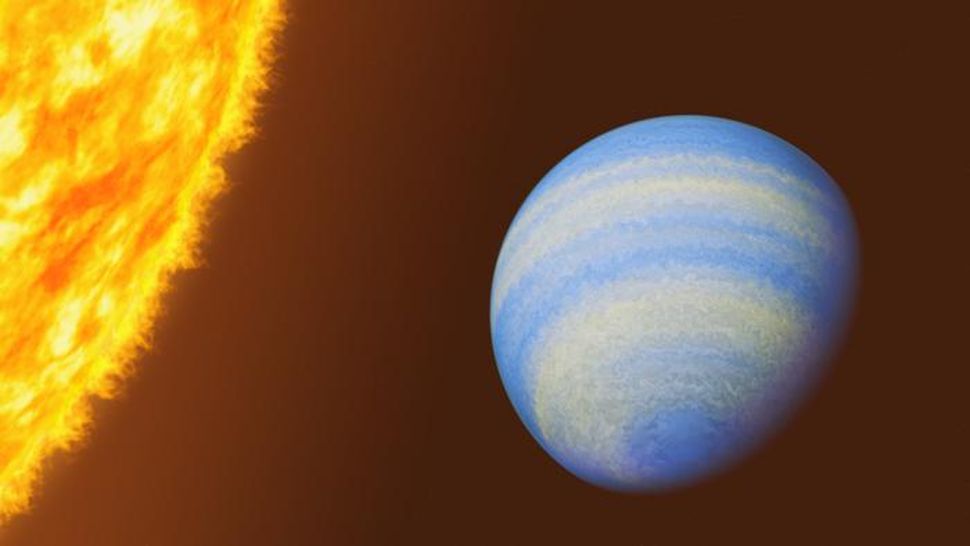Science
Related: About this forumStench of a gas giant? Nearby exoplanet reeks of rotten eggs. And that's a good thing
By Press Releases
Research led by Guangwei Fu (Johns Hopkins University), et al
Jul 08, 2024

Concept art of HD 189733 b, the closest transiting hot Jupiter to Earth. (Image credit: Roberto Molar Candanosa/Johns Hopkins University)
BALTIMORE — An exoplanet infamous for its deadly weather has been hiding another bizarre feature—it reeks of rotten eggs, according to a new Johns Hopkins University study of data from the James Webb Space Telescope.
The atmosphere of HD 189733 b, a Jupiter-sized gas giant, has trace amounts of hydrogen sulfide, a molecule that not only gives off a stench but also offers scientists new clues about how sulfur, a building block of planets, might influence the insides and atmospheres of gas worlds beyond the solar system. The findings are published today in Nature.
“Hydrogen sulfide is a major molecule that we didn’t know was there. We predicted it would be, and we know it’s in Jupiter, but we hadn’t really detected it outside the solar system,” said Guangwei Fu, an astrophysicist at Johns Hopkins who led the research. “We’re not looking for life on this planet because it’s way too hot, but finding hydrogen sulfide is a stepping stone for finding this molecule on other planets and gaining more understanding of how different types of planets form.”

HD 189733 b has been the benchmark planet for atmospheric characterization since its discovery in 2005. (Image credit: Roberto Molar Candanosa/Johns Hopkins University)
In addition to detecting hydrogen sulfide and measuring overall sulfur in HD 189733 b’s atmosphere, Fu’s team precisely measured the main sources of the planet’s oxygen and carbon—water, carbon dioxide, and carbon monoxide.
More:
https://studyfinds.org/exoplanet-reeks-of-rotten-eggs/

Judi Lynn
(162,385 posts)By Harry Baker published 45 minutes ago
The James Webb Space Telescope revealed that the hot Jupiter exoplanet HD 189733 b, located just 64 light-years from Earth, has an atmosphere full of hydrogen sulfide, meaning it likely smells of rotten eggs.

Artist's interpretation of a blue gas giant exoplanet very close to a sun-like star
Exoplanet HD 189733 b circles its home star 13 times closer than Mercury orbits the sun. (Image credit: Roberto Molar Candanosa/Johns Hopkins Univeristy)
A hellish "hot Jupiter" planet situated relatively close to Earth would likely smell like rotten eggs if we ever made the trip to visit it, new data from the James Webb Space Telescope (JWST) reveals.
HD 189733 b is a gas giant located around 64 light-years away in the Vulpecula constellation. It orbits extremely close to its home star — around 13 times closer than Mercury orbits the sun — and completes one orbit every two days.
As a result, the exoplanet's surface can reach a scorching-hot 1,700 degrees Fahrenheit (925 degrees Celsius) — hot enough to melt certain types of rocks into magma.
Previous observations revealed that the exoplanet likely rains molten glass, which is probably blown sideways by winds that travel up to 500 mph (800 km/h) — around three times faster than a Category 5 hurricane on Earth.
More:
https://www.livescience.com/space/exoplanets/james-webb-telescope-reveals-rare-rotten-egg-atmosphere-around-nearby-hell-planet